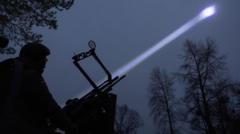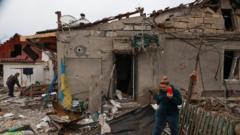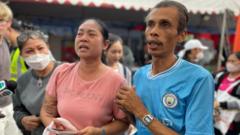**Near-nightly drone attacks contribute significantly to increasing anxiety and sleep deprivation across the nation, leading to a national health crisis.**
**Sleep Deprivation: A Psychological Crisis Amid the Ukraine War**

**Sleep Deprivation: A Psychological Crisis Amid the Ukraine War**
**As the conflict continues, sleeplessness plagues many Ukrainians, highlighting severe mental health struggles.**
In Ukraine, ongoing war conditions have not only resulted in a physical toll but also a severe psychological fallout, particularly through sleep deprivation. Experts underline that continual drone attacks are primary factors exacerbating this distress.
Take the case of Sofia Tsarenko, a 22-year-old from Dnipro, who initially coped with anxiety by drinking wine with friends. However, as the war persisted, her reliance on alcohol transformed into a need for sleeping pills and antidepressants—despite the temporary relief these provided. Her experience reflects a broader narrative of Ukrainian civilians grappling with deteriorating mental health.
Experts are calling attention to the psychological ramifications of chronic sleep deprivation, also described as “sleep debt.” Such conditions can lead to heightened anxiety, irritability, and depression, significantly impacting day-to-day life. The situation is precarious; with drones threatening nightly, many Ukrainians are left in a state of anxiety, anticipating attacks.
As peace talks unfold, tensions appear to escalate, with Russia intensifying drone campaigns against urban centers, like the recent severe strike in Kyiv. The psychological gravity of this tension cannot be underestimated and has transformed sleep deprivation into a national crisis, highlighting the urgent need for mental health support in war-torn Ukraine.
Take the case of Sofia Tsarenko, a 22-year-old from Dnipro, who initially coped with anxiety by drinking wine with friends. However, as the war persisted, her reliance on alcohol transformed into a need for sleeping pills and antidepressants—despite the temporary relief these provided. Her experience reflects a broader narrative of Ukrainian civilians grappling with deteriorating mental health.
Experts are calling attention to the psychological ramifications of chronic sleep deprivation, also described as “sleep debt.” Such conditions can lead to heightened anxiety, irritability, and depression, significantly impacting day-to-day life. The situation is precarious; with drones threatening nightly, many Ukrainians are left in a state of anxiety, anticipating attacks.
As peace talks unfold, tensions appear to escalate, with Russia intensifying drone campaigns against urban centers, like the recent severe strike in Kyiv. The psychological gravity of this tension cannot be underestimated and has transformed sleep deprivation into a national crisis, highlighting the urgent need for mental health support in war-torn Ukraine.






















